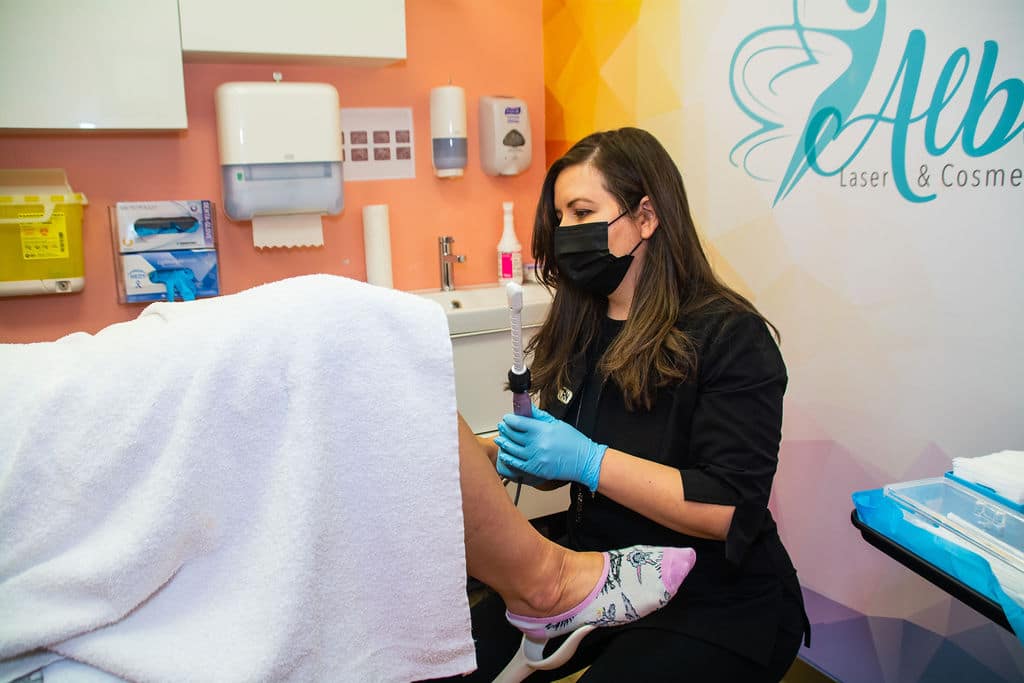Understanding sexual dysfunction
Sexual dysfunction is a common issue that affects many women, affecting their quality of life and relationships. It can be a difficult and sensitive topic to discuss, but seeking treatment for sexual dysfunction is important for both physical and emotional well-being.
At Albany Cosmetic and Laser Centre, a clinic located in Edmonton, we understand the impact that sexual dysfunction can have on women and offer effective treatments to help them overcome these issues.
Our team of medical professionals includes Dr. Adel Abdulhafid and R.N. Dima Omean, who are dedicated to providing the highest quality of care and support to each and every patient, helping them to regain their confidence and improve their overall quality of life. If you’re struggling with sexual dysfunction, don’t wait any longer to seek help. Contact Albany Cosmetic and Laser Centre today to learn more about our treatments and how we can help.

Cuases and types of dexsual dysfunction
Sexual dysfunction refers to a range of problems that can occur during any stage of the sexual response cycle and can prevent a person from experiencing sexual satisfaction. There are various causes of sexual dysfunction, including physical, psychological, and lifestyle factors.
- Physical Causes: Physical causes of sexual dysfunction can include hormonal imbalances, chronic medical conditions, such as diabetes or heart disease, nerve damage, and the side effects of certain medications. Some medical treatments, such as radiation or surgery, can also result in sexual dysfunction.
- Psychological Causes: Psychological causes of sexual dysfunction can include stress, anxiety, depression, relationship problems, and past traumatic experiences. Negative body image, low self-esteem, and a history of sexual abuse can also contribute to sexual dysfunction.
- Lifestyle Causes: Lifestyle factors, such as alcohol and drug use, smoking, and a lack of physical activity, can also contribute to sexual dysfunction. In addition, a sedentary lifestyle, poor diet, and lack of sleep can also impact sexual health.
There are several subtypes of sexual dysfunction, including:
- Female Sexual Arousal Disorder (FSAD): FSAD is characterized by difficulty becoming sexually aroused or achieving orgasm.
- Female Sexual Pain Disorders: This includes conditions such as dyspareunia (painful intercourse) and vaginismus (painful muscle spasms in the vaginal area).
- Hypoactive Sexual Desire Disorder (HSDD): HSDD is characterized by a lack of interest in sexual activity.
- Male Erectile Dysfunction (ED): ED is characterized by the inability to achieve or maintain an erection.
- Male Orgasmic Disorder (MOD): MOD is characterized by difficulty achieving orgasm during sexual activity.
It’s important to note that sexual dysfunction can be a complex issue, and the underlying cause can vary from person to person. Seeking treatment from a medical professional, such as those at Albany Cosmetic and Laser Centre, can help to identify the cause of the issue and develop an effective treatment plan.
How can we help?
Vaginal rejuvenation treatments, such as Laser Vaginal treatment (Fotona Tightlase and Intimalase) and Votiva radio-frequency vaginal treatment, offered at Albany Cosmetic and Laser Centre, are designed to improve a range of sexual health concerns, including those related to sexual arousal, sexual pain, and vaginal tightness.
Laser vaginal rejuvenation treatments can be especially effective for women experiencing Female Sexual Arousal Disorder (FSAD), as they can help to improve blood flow to the vaginal area and increase vaginal lubrication. This can result in increased sexual arousal and improved sexual satisfaction.
In addition, laser vaginal rejuvenation treatments can also be helpful for women experiencing Female Sexual Pain Disorders, such as dyspareunia (painful intercourse) and vaginismus (painful muscle spasms in the vaginal area), as they can help to improve vaginal elasticity and reduce discomfort during sexual activity.
It’s important to note that individual results can vary, and the best treatment option will depend on the specific sexual health concerns of each patient. A consultation with a medical professional at Albany Cosmetic and Laser Centre can help determine the most appropriate treatment plan.
What is the differences between Votiva and Fotona

Both technologies use heat to raise the temperature of the vaginal tissue to 42 C. People use the term “structural remodeling” to describe how the tissues change and become tighter at this temperature (rejuvenation). However, the main difference is that the thermal energy source is very different: it comes from the ground.
Votiva
This radiofrequency machine uses RF technology to achieve the clinical temperature. Moreover, the Votiva machine has the Fractora microneedling attachment to treat the outer vaginal region.
Fotona Laser
This is an Er:Yag laser machine with advanced laser settings. There, it relays on laser technology to produce heat and induce vaginal tissue remodeling. Fotona has developed the Intmalase and Renovalase attachment for inner and outer vaginal treatment.
Intimalase Sexual Dysfunction Treatment FAQS
Is Vaginal Laser Safe?
Who is a Good Candidate?
Who is not a Good Candidate?
People who are taking photosensitive drugs, have been hurt, or have a vaginal infection. People who have a vaginal bleeding that hasn't been found or who are still having their period should see their doctor if they need help.